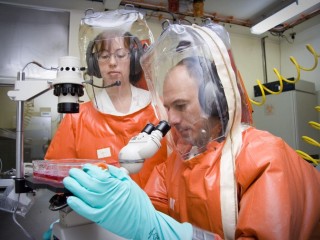 Lessons learned from the recently successful campaign to rid the world of Rinderpest cattle plague could assist in controlling other devastating diseases such as FMD, according to world renowned veterinarian, Dr Peter Roeder.
Lessons learned from the recently successful campaign to rid the world of Rinderpest cattle plague could assist in controlling other devastating diseases such as FMD, according to world renowned veterinarian, Dr Peter Roeder.
The Secretary of the Global Rinderpest Eradication Program from 2000 to 2007, Dr Roeder will discuss the success of the campaign – regarded as one of the most important achievements in veterinary history – when he presents a lecture in Melbourne today.
“This is the first time that humans have succeeded in wiping out an animal disease in the wild, and only the second time, after smallpox in 1980, that a disease has been eliminated thanks to efforts over 50 years,” Dr Roeder said.
Rinderpest plague characteristically causes fever, oral erosions, diarrhoea, lymphoid necrosis and high mortality in affected animals.
Although it does not directly affect humans, it has the ability to cause swift, massive losses of cattle and other hoofed animals, leading to devastating effects on agriculture and national economies.
“Reflection on the remarkable achievement in eradicating this disease allows lessons to be drawn from the process, which are also applicable to the control of other transboundary animal diseases,” Dr Roeder said.
 CSIRO’s Australian Animal Health Laboratory (AAHL) Director, Professor Martyn Jeggo – who spent 17 years involved in GREP while working for the United Nations – said knowledge gained from the campaign’s success would enhance Australia’s ability to manage livestock diseases.
CSIRO’s Australian Animal Health Laboratory (AAHL) Director, Professor Martyn Jeggo – who spent 17 years involved in GREP while working for the United Nations – said knowledge gained from the campaign’s success would enhance Australia’s ability to manage livestock diseases.
“Australia has its own history of successes with the eradication of a number of livestock diseases, including brucellosis and tuberculosis,” Professor Jeggo said.
“Most recently the successful eradication of horse flu was a remarkable national achievement.
“As we move forward we can further learn from the rinderpest eradication process and how to apply this in the context of our own disease challenges both now and in the future.”
Dr Roeder will present the CSIRO's biannual Snowdon Lecture in Melbourne today. Named in honour of CSIRO AAHL Foundation chief, Dr Bill Snowdon, the Lecture has been presented by many world leading scientists and veterinarians over the past two decades.
This year the Lecture is part of the Vet2011 Symposium celebrating veterinary education and achievements in Australia, which is part of the international 250th anniversary of the establishment of the world's first veterinary school, in Lyon, France.
Coincidently the veterinary school was originally established to train people in the control of rinderpest.
AAHL, the Department of Agriculture Forestry and Fisheries, and the Australian Veterinary Association are jointly hosting Vet2011.
